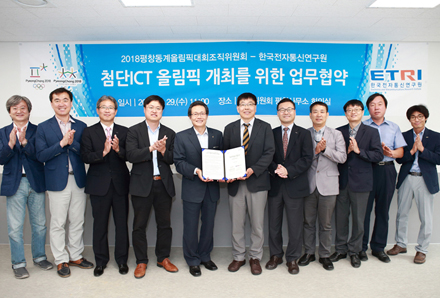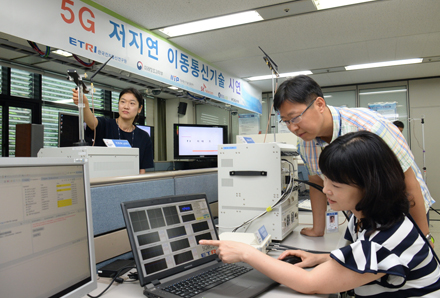
ETRI’s Advanced ICT to Support the 2018 PyeongChang Winter Olympics
ETRI is directing its technological prowess to the 2018 PyeongChang Winter Olympics to turn the event into a sports games supported by state-of-the-art ICT. The institute will introduce a wide range of technological developments including 5G high-speed data transmission, UHD broadcasting, a multilingual automatic translation service, and IoT-based safety management.
On June 29, ETRI signed an agreement with the PyeongChang Organizing Committee for the 2018 Olympics and Paralympic Winter Games. Under the agreement, ETRI will provide 11 advanced ICT deliverables to the global sports event in five broad areas: 5G mobile service, digital broadcasting, artificial intelligence, immersive content, and safety.
Specifically, major technologies to be employed in 2018 include: a mobile hotspot network to allow Giga-scale mobile data transmission and undisturbed viewing of UHD videos on the high-speed trains connecting Incheon and Gangneung; ultrafast proximity communication to transmit Giga-scale large data within a 10-centimeter diameter; high-resolution large-screen imaging technology to maximize reality through wide-angle images; and color holograms that can be simultaneously viewed by a number of users from all directions. ETRI will also showcase a real-time automatic translation service for seven languages ; English, Japanese, Chinese, French, Spanish, Arabic and Russian as well as artificial intelligence services for navigation. Other key features are technology to forecast and analyze the risks at the Olympic stadiums and adjacent roads and the technology for telemedicine.
“We will closely work together with the Organizing Committee to provide perfect ICT services at the 2018 PyeongChang Winter Olympics,” said Dr. Bong Tae Kim, Senior Vice President of the Future Technology and Strategy Research Laboratory, ETRI.

ETRI’s Core 5G Technology to Significantly Cut Transmission Delay
Fast data communication speed is a prerequisite to control robots or drones remotely and to process in real time the data recognized by self-driving car sensors. Another requirement is a short service delay, referring to the time cost, in mobile data transmission, for the data sent by a smartphone or sensor to reach another device via base stations and servers. Currently, the service delay time in 4G mobile communication is at least 0.02 seconds. However, a group of researchers in Korea have recently developed a core 5G mobile communication technology to reduce the service delay to 0.002 seconds, only one-tenth the delay in the 4G environment. As announced on June 30, ETRI in partnership with SK Telecom successfully verified the 5G low-delay technology to realize a 0.002-second service delay time in a test using an inverted pendulum.
An inverted pendulum is used to keep balance through the center of gravity placed on its upper part. The test by ETRI involved remote control through wireless communication between the motion control part of the inverted pendulum and the base station. To verify the technology, ETRI researchers developed a test bed consisting of a device, a base station, and an application server. The recent technology is characterized by its ability to realize fast communication response speed between devices to prepare for the instantly changeable situations in the era of 5G mobile communication. For instance, it can be applied to a vehicle collision prevention system to swiftly send signals to the cars coming after a car accident. It can be also used in a telemedicine system to control surgical equipment in real time to respond to the changing conditions of patients in an operation or in drone operation and high-precision remote control of robots in real time.
The researchers are planning to load the latest development inside smartphones and other communication devices in the form of communication modem chips or apply it to base stations as chips or in software format. The technology was included in over 50 domestic and international patent application cases.
“With the new technology, we will be able to discover new application services and business models that require extremely short service delay time through mobile communication networks,” explained Dr. Hyun Kyu Chung, Senior Vice President of the 5G Giga Communication Research Laboratory.
